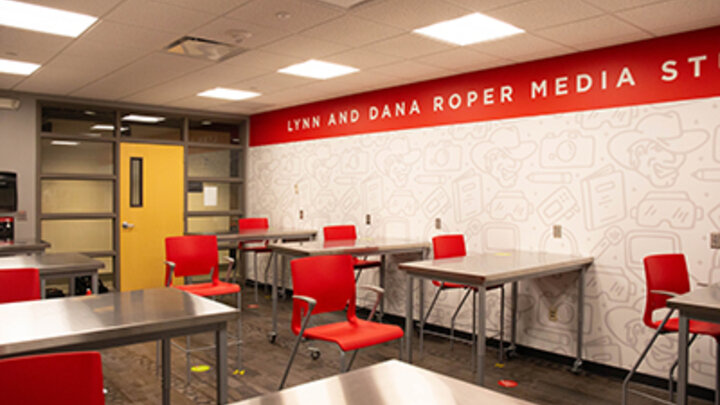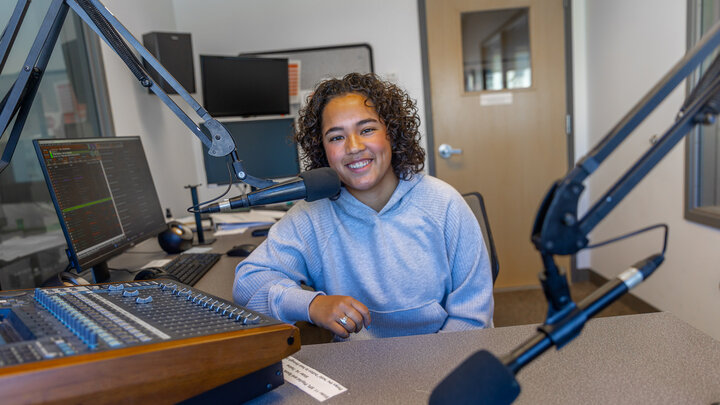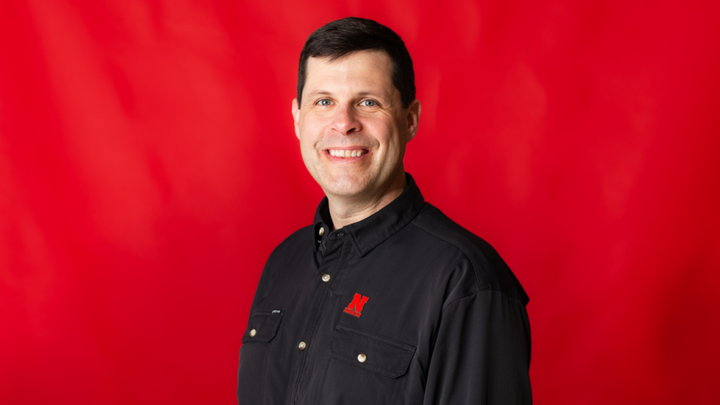The global coronavirus pandemic of 2020 has presented unprecedented challenges for everyone, including colleges and universities. During all the turmoil throughout the year, the College of Journalism and Mass Communications has remained committed to educating the next generation of journalists and communicators during every up and down throughout the year.
Planning for the pandemic started early in February 2020.
"Faculty and staff in the college began to see that the pandemic was spreading and we wanted to be prepared," said Amy Struthers who was interim dean of the College of Journalism and Mass Communications until June 30. "We called upon the university's Center for Transformative Teaching to begin preparing our faculty for the possible move to remote learning."
Amy Ort, an instructional designer assigned to the college, hosted weekly workshops on how to rethink classes, focus on what matters and adapt to an online environment.
Throughout March, the pandemic spread throughout the country, and universities began to announce campus closures and move online. In mid-March, the inevitable happened at UNL. Chancellor Ronnie Green announced that the university would close for two weeks and then reopen with all classes offered online. The University encouraged students to move home if possible, and faculty and staff were encouraged to work remotely.
Struthers appointed an emergency planning team comprised of faculty and staff in the college to coordinate the transition. The college increased its efforts to adapt to the shift to online teaching. Faculty, staff and administration scheduled additional workshops and formed working groups to tackle common classroom problems. The college conducted a student survey to gather information about their fears and challenges - physical and technological - through the transition. Following the survey, the college's academic advising team contacted each and every student who indicated they were fearful or didn't have the technology to learn remotely. Through their one-on-one conversations, advisers answered student questions and connected them to the services and support they needed to be successful.
Technology was a big concern for students. The college's tradition of hands-on instruction has been facilitated by technology including laptops, cameras, video cameras and more. Some didn't have laptops needed to access the internet to take their classes. The college repurposed as many machines as it could find and then partnered with ITS to offer loaner laptops to students in need. Access to the college's checkout room, which provides students access to cameras, video cameras, lights and other equipment, was also a concern. With the university' closed, the checkout room was no longer available. A team of faculty led by Katie Krcmarik developed alternatives using apps that would provide the students with the same photography and videography skills that regular equipment would provide. The checkout room, ITS and the faculty worked together to purchase the app and distribute it directly to student smartphones. For those who didn't have smartphones, Changmin Yan, another faculty member, loaned the college iPods purchased as part of a research project, that were loaded with the apps and shipped to students.
"The transition to online learning in the spring wasn't smooth," Struthers said. "But the college's commitment to students carried us through. Challenge after challenge was confronted and overcome by the dedicated faculty and staff in Andersen Hall."
As the pandemic continued to rage and uncertainty about its duration grew, University of Nebraska President Ted Carter announced in April that on-campus classes would resume in the fall. Knowledge about the virus and its transmission was growing and staff in the college knew that a successful reopening in the fall would take careful preparation and planning.
At the same time, the college began a leadership transition from Struthers, who had served as interim dean since January 2018, to Shari Veil, who officially took over as dean on July 1, 2020. Struthers and Veil worked together through the end of the spring semester and the summer to ensure continuity in leadership through the tumultuous time.
Together, they expanded the emergency planning team and appointed subcommittees to address all areas of college life. Director of Undergraduate Education and Associate Professor Adam Wagler spearheaded efforts to prepare faculty and classes for a radically altered fall semester.
"One of the biggest challenges in planning for the fall was the hyper-flexibility we needed to offer faculty and students," Wagler said. "Some faculty and students needed to attend classes remotely, some needed to attend in person and how you attended could change throughout the semester depending on the spread of the virus."
To accomplish this hyper flexibility, Wagler took a multi-pronged approach that included offering a variety of course formats, coordinating additional opportunities for faculty to strengthen their skills and working to ensure every classroom was outfitted with audiovisual technology to offer classes online and in-person simultaneously.
In addition to preparing the faculty and classes, the college also worked to prepare Andersen Hall for the new social distancing and capacity guidelines. Classroom capacities were restricted and all seating had to be at least 6 feet apart to limit any spread of the virus. Over the summer months, the college worked to rearrange every classroom and meeting space to adhere to these guidelines and remove excess seating. The seating capacity of the entire building was reduced by 70%.
Some of the college's unique spaces took special consideration. The checkout room, where students borrow a variety of equipment, serves about 12,000 students per year. The close proximity of checkout room staff to a wide variety of students, as well as the virus's ability to live on plastic and metal surfaces, made the checkout room an area of particular concern. Checkout Room Manager Susan Oestmann was not deterred by the daunting task of opening the checkout room while making sure that employees and students alike were safe.
"Learning and trying new equipment is an essential part of the student experience in our college. It is also vital to student's marketability after graduation," Oestmann said. "We knew we could develop a solid plan that would keep our operations open for students while ensuring their safety."
Oestmann dug in and started to research best practices related to the virus. She also consulted with other colleges and universities throughout the country, as well as the UNL Office of Information Technology Services and UNL Libraries, which run similar operations. In the end, she developed a plan that installed physical barriers in key locations, used technology to reduce in-person interactions, created a secondary checkout room location to reduce congestion, and quarantined and cleaned equipment between uses. These efforts have kept the checkout room open and available for students throughout the fall semester.
After significant planning and preparation, Veil wanted to make sure that students were informed and knew what to expect for the fall semester.
"Communication is so important in successfully navigating difficult situations," Veil said. "We had prepared. We wanted to make sure our students were also prepared."
The college built a webpage detailing what students could expect in the fall semester. Each class was listed, along with a description of how the class would be formatted. Information on the facilities, clubs and organizations, the checkout room and student services was also made available for students. A series of town hall discussions were held late July for all students and their parents. The discussion focused on the fall semester and provided students and parents the opportunity to ask questions.
Once the fall semester began, the planning and preparation for students really paid off. Not only have classes continued throughout the fall semester, but student clubs and organizations have been going strong. In-person and online experiences have allowed students to stay engaged in the college.
"Though the pandemic has forced the UNL PRSSA Chapter to shift the conventional structure of in-person meetings to a hybrid of online meetings and in-person events, we are still prioritizing our commitment to help students broaden their networks, enhance their education and launch their careers," said Jemalyn Griffin, assistant professor of practice and faculty adviser for the UNL Public Relations Student Society of America.
"Overall things have gone smoothly," Veil said. "Although the pandemic has required us to be enormously flexible, our focus on students has allowed us to continuing offering our students a first-class education and college experience."




